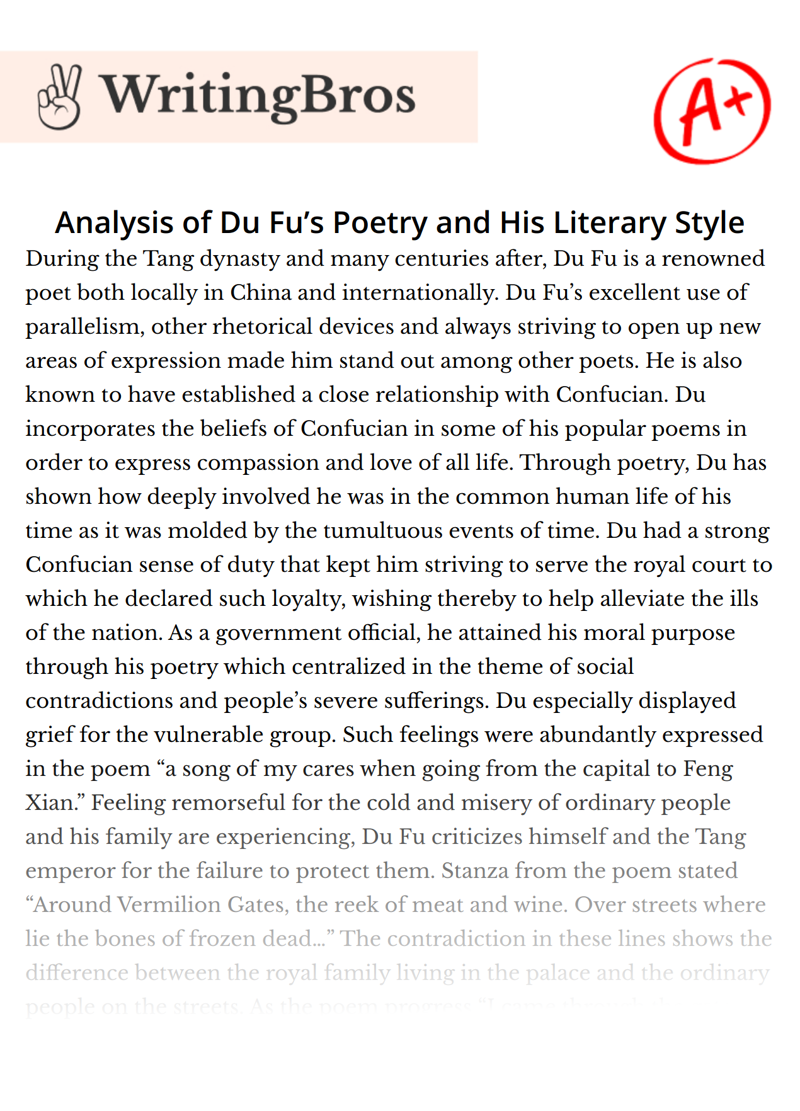Analysis of Du Fu’s Poetry and His Literary Style

During the Tang dynasty and many centuries after, Du Fu is a renowned poet both locally in China and internationally. Du Fu’s excellent use of parallelism, other rhetorical devices and always striving to open up new areas of expression made him stand out among other poets. He is also known to have established a close relationship with Confucian. Du incorporates the beliefs of Confucian in some of his popular poems in order to express compassion and love of all life. Through poetry, Du has shown how deeply involved he was in the common human life of his time as it was molded by the tumultuous events of time.
Du had a strong Confucian sense of duty that kept him striving to serve the royal court to which he declared such loyalty, wishing thereby to help alleviate the ills of the nation. As a government official, he attained his moral purpose through his poetry which centralized in the theme of social contradictions and people’s severe sufferings. Du especially displayed grief for the vulnerable group. Such feelings were abundantly expressed in the poem “a song of my cares when going from the capital to Feng Xian.” Feeling remorseful for the cold and misery of ordinary people and his family are experiencing, Du Fu criticizes himself and the Tang emperor for the failure to protect them. Stanza from the poem stated “Around Vermilion Gates, the reek of meat and wine. Over streets where lie the bones of frozen dead…” The contradiction in these lines shows the difference between the royal family living in the palace and the ordinary people on the streets. As the poem progress “I came through the gate… my youngest child had died of starvation...” Du Fu’s child has died from hunger yet there’s nothing he can do about it. He showed grief and started blaming himself for not protecting his family in the last line of the poem which writes “Sorrow’s source is as huge as South Mountain…” Hyperbole is used here describing sorrow and this evoke strong feelings which shows how sorrow Du Fu was. Du Fu echoed the poor people’s grief by sharing his individual struggles as well as sufferings of that period.
Love is a mandatory code of ethics for human beings. Du Fu loved his friends, families and relatives. In addition to human beings, Du Fu also loved animals, nature and so on. One such literary work that merely display the affection for nature is “Quatrain.” The poem reads “Two yellow orioles chirp from the green willows, A file of white egrets ascends the clear sky.” The words, “yellow”, “green”, “white” and “blue”, are known as the analogous color which contrast with each other in order to create serene and comfortability that are pleasing to the eyes. The four colors also implies to the seasons of spring and summer. The ingrained references to these seasons were build up for the next stanza, where Du mentions the Western mountains. As the poem continues “My window frames the Western mountains cloaked in autumnal snow…” The effective reference to fall and winter has a contrasting response which reveals the capability of the nature in expressing beauty irrespective of the season.
Lastly in the poem “My boat, resting at the doorway, will take me thousands of miles to Eastern Wu.” The “doorway” can be seen as a reference to the water that the boat rests on and it signifies the boundary between civilization and nature. By implying to water in the last line of this delicate poem, Du Fu draws the relationship between the natural world and humanity — both are appealing in their individual manners.
Du Fu’s affection of all life is intrinsic and it is a crucial advancement of benevolence. Poetry is an art which can paint any historical background. It also displays sorrow, delightfulness and beauty of certain situation. Du Fu’s poetry incorporated truth and false, the good and the evil, also the beauty and the ugliness. As one of the figures in the history of the Tang Dynasty, Du Fu’s poetry embodied in the poet’s personal emotions and the society. He believed in Confucianism and the inner spirit of his poems is the Confucian way.
References
- Cooper, D. (2014). The Poetry of Du Fu: An Introduction. Cambridge University Press.
- Davis, A. R. (1990). The Penguin Book of Chinese Verse. Penguin Classics.
- Ding, X. (2015). Du Fu’s Poetry and the Chinese Poetic Tradition. Brill.
- Gao, M. (2008). The Art of Translation: Renderings of Tang Poetry in English Verse. University of Hawaii Press.
- Hinton, D. (2008). The Selected Poems of Du Fu. New Directions.
- Kroll, P. W. (1991). The Cloudy Mirror: Tension and Conflict in the Writing of Sima Qian. SUNY Press.
- Mair, V. H. (1994). The Columbia Anthology of Traditional Chinese Literature. Columbia University Press.
- Watson, B. (1971). Early Chinese Literature. Columbia University Press.
Cite this Essay
To export a reference to this article please select a referencing style below

